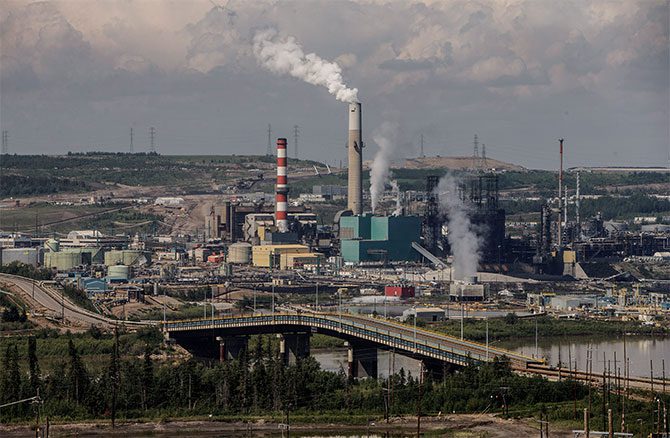Toronto | Traditional territories of the Mississaugas of the Credit, the Anishinaabeg, the Haudenosaunee, and the Wendat – Today Environmental Defence published a new report titled, Gas Is Not Green: Why Gas Does not Belong in A Canadian Sustainable Finance Taxonomy that outlines why fossil fuels like ‘natural’ gas should not be included under a sustainable finance label.
The report illustrates why including ‘natural’ gas under the sustainable finance label would undermine the tool’s credibility, invalidating the efforts to date. It highlights that ‘natural’ gas production and export is not aligned with Canada’s federal climate goals, as it is a significant pollutant composed of over 85 per cent methane. Methane is responsible for 30 per cent of the current global temperature rise to date globally, and over 14 per cent of Canada’s annual greenhouse gas emissions.
“A taxonomy is supposed to clear up greenwashing, but including fossil fuels like ‘natural’ gas under a sustainable finance taxonomy would muddy the waters rather than clarify them. It would counter the expertise of climate scientists, and would damage the label’s credibility internationally,” said Julie Segal, Senior Manager of Climate Finance at Environmental Defence Canada. “To advance a climate aligned financial system, fossil fuels like ‘natural’ gas should not be included under a Canadian sustainable finance label.”
The report discusses that since 2021, the Canadian government has been working on a ‘taxonomy’ to define and label which projects or investments align with the government’s goal of achieving net-zero emissions by 2050. It outlines concern that fossil fuels like ‘natural’ gas and related carbon capture, utilization, and storage (CCUS) could be included under the sustainability label.
Highlighting that climate change is made worse by the production, combustion, and export of ‘natural’ gas, the report outlines why these activities can not be considered sustainable. In many cases, ‘natural’ gas is found to be more polluting than coal as an energy source due to significant methane leaks during its lifecycle.
“Policymakers must set new rules and guidance to align financial flows with climate goals, and if done right, a sustainable finance labelling system is one piece of this policy package. But in order to have any credibility internationally, the Canadian taxonomy must distinguish between projects that are truly aligned with limiting warming to below 1.5-degrees and those that are not. Simply put, gas has no place in a sustainable taxonomy,” said Segal.
Supporting Quotes:
“Taxonomies must aim to channel investment to green activities and facilitate the transition to a net zero future — and there is no room for new fossil fuels in that future. Investor concerns around methane leakage and the risks of stranded assets mean that including fossil gas in taxonomies may reduce demand for a specific region’s green bonds. It is vital that taxonomies and locally issued green bonds are aligned with investor requirements and scientific consensus, which means prioritizing renewable energy and rapid decarbonisation, not further investment in fossil fuels,” said Sean Kidney, Co-founder and CEO at Climate Bonds Initiative.
“Including LNG or other fossil fuel expansion within a framework of sustainable investment is like saying filtered cigarettes are okay in a health plan. The science is clear, we need to stop expanding fossil fuels and phase them out if we want to meet our climate targets. Including LNG and gas expansion in a sustainable finance taxonomy is quite literally like throwing gas on the fire,” said Tzeporah Berman, Founder of the Fossil Fuel Non-Proliferation Treaty Initiative.
“A sustainable taxonomy is to be welcomed because it should help investors to gain a better understanding of what sustainable investment is, which in turn should drive the sustainable transition and combat greenwashing. However we believe fossil fuels such as natural gas do not belong in such a taxonomy. The science is clear that ending new exploration and expansion and phasing-out fossil fuel production is critical over the next decade to keep the world in line with global climate goals and to avoid catastrophic climate disruption. With global leaders falling short, the financial sector should now step up. Financial institutions have a choice to be part of the solution by taking their own responsibility. Only with truly green investments can we accelerate towards a sustainable, low carbon economy,” said Hadewych Kuiper, Managing Director at Triodos Investment Management.
Background:
-
The Federal Government reaffirmed its commitment to deliver a sustainable finance taxonomy, as recently as the 2024/25 Federal Budget.
-
Earlier this week on May 13th, Members of Parliament from four parties and an independent Senator joined Environmental Defence for a webinar to discuss their parties’ approach to new rules for sustainable finance, including the sustainable finance taxonomy.
-
Over three-quarters of people in Canada want new rules to address greenwashing within the financial sector.
ABOUT ENVIRONMENTAL DEFENCE (environmentaldefence.ca): Environmental Defence is a leading Canadian environmental advocacy organization that works with government, industry and individuals to defend clean water, a safe climate and healthy communities.
– 30 –
For more information or to request an interview, please contact:
Alex Ross, Environmental Defence, media@environmentaldefence.ca






